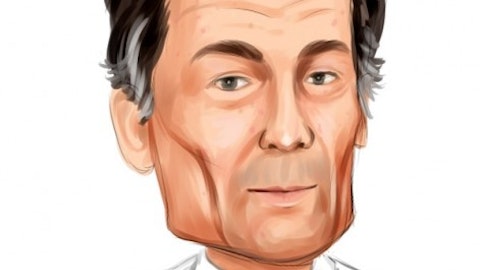PS, they’re also probably more exposed to tech than many of our businesses. So we’ve seen client attrition and lower growth there. And Huge has pretty clear line of sight into what their new value proposition is, and that will be going in the market probably towards the end of the first quarter here. So they’ve also been because of the strength that you call out, tying them more into whether it’s open architecture or whether it’s the kind of the overall data stack that we’ve built is clearly something that we need to focus on. So it may be that long-term success. And a measure of independence is something that is going to need to be addressed. And then on the question around new business, again, we now see new business in the big media pitches and then in some of the more traditional parts of the business probably the creative ad agencies and some degree, PR.
We don’t see the new business within health very much. And then a lot of what’s going on, as I said, has become project specific. So I’d say we are going into the year exactly, as you said, with a modest headwind. And then was there 1 piece of the question that I’m forgetting at this point? And then health. I think we see health at scale now, having put these assets together. And as we said, trailing very, very strong performance, doing high single digit in the quarter. That’s probably consistent with what they did for the year, and that’s consistent with the expectation that we have for them as we go into ’23.
Steven Cahall: Great. And then maybe just a short follow-up for Ellen. Working capital was a big use in ’22 I think it was favorable in ’21. I know the timing of the year can be a strange line to draw on the sand, but should we expect it to then be back to probably a benefit in ’23?
Ellen Johnson: So as we’ve pointed out, working capital is volatile. Whether you get paid on the 31st to the first, you’re right, when you print your balance sheet and cash flow makes a big difference. It is something that we spent a lot of time and have a lot of discipline around and carefully manage. And if you go back over the past 4 years, I think we’ve generated a billion in working capital. So I would expect going forward, it will normalize. But you’re right. In any 1 year, you can get an aberration.
Steven Cahall: Thank you.
Philippe Krakowsky: Thank you.
Operator: Thank you. Our next question is from Michael Nathanson with MoffettNathanson. You may go ahead.
Michael Nathanson: Thank you. Good morning, Philippe.
Philippe Krakowsky: How are you?
Michael Nathanson: I am good. How are you? I want to ask you about the RafterOne acquisition. I believe it’s the biggest deal since Acxiom. If you go back to the history of the company, it’s probably 1 of the biggest deals we’ve seen, right? So can you talk a little bit more about the necessity to do it, the multiples of skill sets and whether or not like this is the beginning and it’s not like we take but the beginning of maybe more tuck-in acquisitions like that. And then Ellen, given the FX volatility, what’s your thinking on the year ahead for FX and any impact from acquisitions and investments to revenue this year? Thanks.



